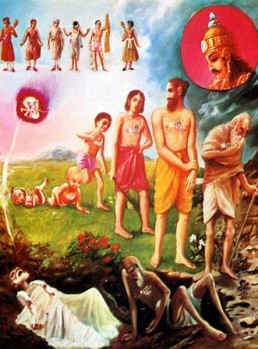Swami Chinmayananda Commentary
The unseen is always explained in terms of the seen, and thereby the unknown becomes fully indicated, rather than defined; for, any unknown thing merely defined in itself remains as unknown as before. Similarly, here the Changeless, Immutable, Self is being described by Lord Krishna in terms of the mutable and everchanging world which is very familiar to Arjuna and all people like us. In the world-of-change, objects come to their annihilation through instruments of death or they are consumed by fire or destroyed by water or dried up by air. These are the various cosmic means and methods by which the objects of the world come to their destruction. All these means are declared as impotent in bringing about the destruction of the Self.
WEAPONS CLEAVE IT NOT — It is very well-known that with an axe one can cut down a thing, and with a bullet one can shoot some other object, but neither can one wound water, fire, air or space with a sword, however sharp it might be. The principle is that no instrument can hit or destroy an element subtler than itself. Naturally, therefore, Atman, the Self, the very cause of the subtlest element, space, and necessarily therefore, subtler than space, cannot be cut asunder by the gross instruments.
FIRE CANNOT BURN IT — Fire generally can burn things other than the fire, but it cannot burn itself. The burning capacity in fire is the very Essence, the Truth in it, and therefore, fire cannot burn its own Essence, viz., its fiery nature. Wherever there is fire, it can consume things only in space and yet, space is never consumed by fire. Things are consumed by fire in space. If space itself cannot be consumed by fire, how impotent it must feel when it tries to consume the cause of space, the Self?
WATER CANNOT MOISTEN IT — Things get soaked only when they have got inter-space in themselves. A piece of bread can be soaked in water or milk, but, a piece of iron cannot be soaked, as iron has no inter-space in it. When the substance is one homogeneous mass containing nothing other than itself to condition it, water cannot enter the substance and, therefore, cannot soak it. Another method of destruction observed is either through the quick effects of water, that is drowning, etc., or through the slow effects of moisture, such as corroding, etc. Even these cannot destroy the Truth.
WIND DRIES IT NOT — Dehydration is possible only when there are some traces of water in the substance dehydrated. Every crystal has its own water of crystallisation, which, when removed, causes the crystals to lose their distinct shapes and forms and get pulverised into a fine powder. These are days when vegetables and food materials are dehydrated for purposes of preservation. This is possible because these substances contain moisture-molecules within them. The Supreme Consciousness contains nothing other than Itself and therefore, annihilation through the process of dehydration is not possible.
Apart from this direct word-meaning, on the whole, the stanza indicates deeper significances which are better brought out in the next stanza, where Lord Krishna gives out how and why the truth is Eternal.
FOR WHAT REASON? WHY AND HOW CAN WE RECOGNISE THE SELF TO BE ETERNAL?
Adi Sankara Commentary
Why does It verily remain unchanged? This is being answered in, ‘Weapons do not cut It,’ etc. Sastrani, weapons; na, do not; chindanti, cut; enam, It, the embodied one under discussion. It being partless, weapons like sword etc. do not cut off Its limbs. So also, even pavakah, fire; na dahati enam, does not burn, does not reduce It to ashes. Ca, and similarly; apah, water; na enam kledayanti, does not moisten It. For water has the power of disintegrating a substance that has parts, by the process of moistening it. That is not possible in the case of the partless Self. Similarly, air destroys an oil substance by drying up the oil. Even marutah, air; na sosayati, does not dry; (enam, It,) one’s own Self. [Ast. reads ‘enam tu atmanam, but this Self’, in place of enam svatmanam.-Tr.]
The Bhagavad Gita with the commentary of Sri Sankaracharya – Translated by Alladi Mahadeva Sastry
Holy Geeta – Commentary by Swami Chinmayananda
The Bhagavad Gita by Eknath Easwaran – Best selling translation of the Bhagavad Gita
The Bhagavad Gita – Translation and Commentary by Swami Sivananda
Bhagavad Gita – Translation and Commentary by Bhaktivedanta Swami Prabupadha
Srimad Bhagavad Gita Chapter 2 – Verse 23 – 2.23 nainam chhindanti – All Bhagavad Gita (Geeta) Verses in Sanskrit, English, Transliteration, Word Meaning, Translation, Audio, Shankara Bhashya, Adi Sankaracharya Commentary and Links to Videos by Swami Chinmayananda and others – 2-23

